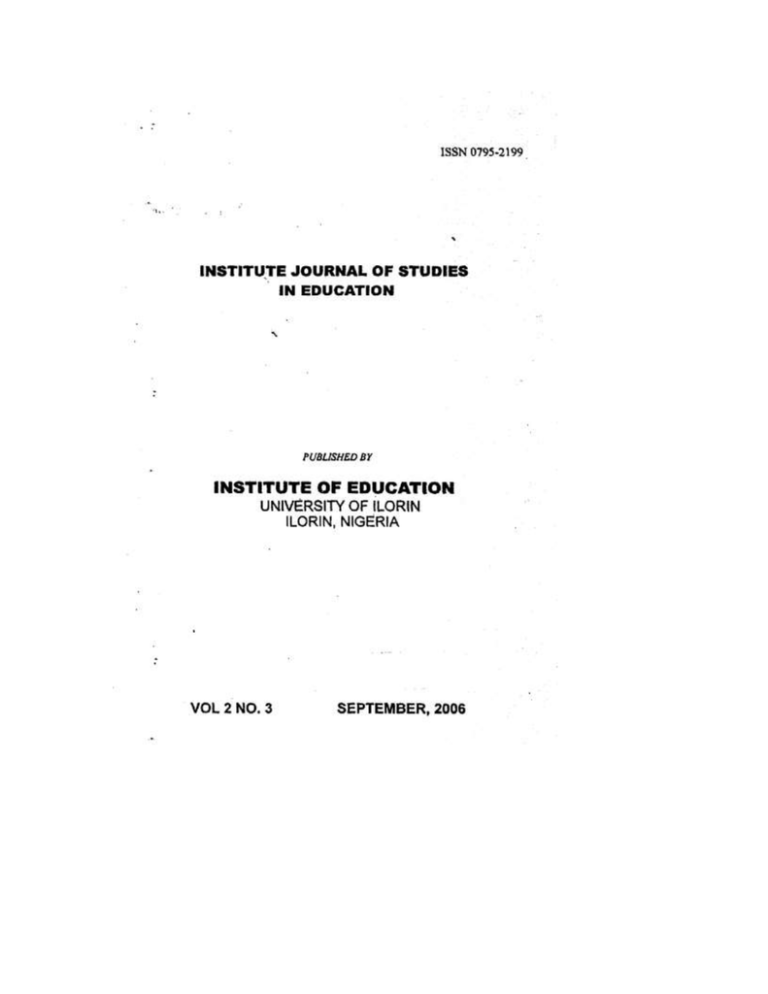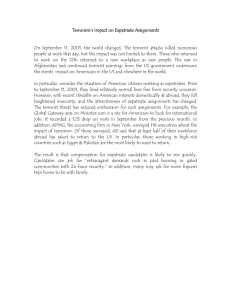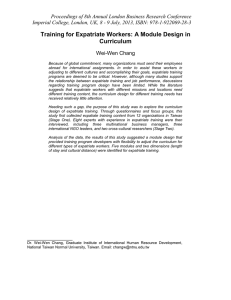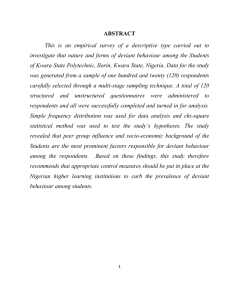Document 16118987
advertisement

THE-ROLE OF EXPATRIATE TEACHERS IN THE TEACHING AND LEARNING OF SCIENCE IN KWARA STATE SECONDARY SCHOOLS (1969-1979) BY ADEBAYO, P. F, Ph. D Abstract This paper discusses the role of expatriate teachers in the Teaching and Learning of Science between 1969 and 1979. It is contended that the paucity of trained and qualified teachers, mostly in science based subjects, led to the recruitment of expatriate teacher in secondary schools in the Old Kwara State between 1969 and 1979. lndeed, the employment of the expatriate teachers complemented the efforts of the few indigenous science teachers In the post-primary institutions. This is reflected in the performance of students in science subjects in public examinations like the West African Examinations (WAEC) taken over a period of eleven years. This has served as justification for their employment by the State ministry of Education. Introduction Education, undisputably, remains the bedrock of any economy, in the past, when Nigeria was just emerging from colonial administration, it needed a rapid development in education so as to be able to maintain a sold civil service on productive economy during the era of self government. The Ashby Communication was set up in this respect. The Commission's report recommended a speedy development in education in order to meet the manpower needs of the country/The fact perhaps provides the background for the interest generated especially by the educationally disadvantaged. North, to which kwara State geo-politically belongs, for the recruitment of expatriate teachers, most especially in the sciences. Emphasis was laid on science because the acquisition of its knowledge and training enhances human capacity towards solving problems. It should be noted that 'Science' which comes from the Latin word "scienta” meeting knowledge or wisdom is hereby viewed as an orgnaised body of knowledge about the natural world the multitude of known facts, concepts linked together by laws and theories which serve to systematize them. To adumbrate more on the word 'Science' as used in this paper, there is the need to recognize the fact espoused by Abdullah! (1991) that there is a distinction between science teaching and science education, terms, which are hitherto used interchangeably. Strictly speaking science teaching has more to do with instruction end condition for the effective leaving of science subjects at the secondary and primary school levels. Science education, on the other hands, goes beyond mere education in science as it includes the philosophical, historical, psychological, sociological, pedagogical and ethical bases of science teaching. Thus, the term "science as used here refers to the so called 'pure or conceptual' science which places emphasis on principles, theories, symbols and as well as 145 understanding of natural objects and events. Conceptual science by this definition is to be distinguished from applied' or technological science which is primary concerned with solutions to practical problems. It is this importance of knowledge of science that make nations all over the World to place emphasis on it. The Northern Nigerian Government, and Kwara State in particular, had this view in mind when it resolved to recruit expatriate teacnws to teach science subjects in its post-primary institution. It should be noted that the Old Kwara State then known as the West Central State, comprising the present Kwara, kogi, some parts of Niger and Benue State created on the 27" May 1967 by the Gowon administration, inherited this policy of expatriate recruitment frorrTNorthern Nigeria. However, the acute shortage of indigenous science teachers in the state was certainly a major factor in its resolve to recruitment of expatriate teachers to teach science subjects in post-primary institution in the State shortly after its creation. For instance, Appendix A shows that there were only 401 teachers in all Kwara State secondary schools in 1969. The average annual growth rates of teachers Were 29.53% between 1969-1973 and 11 % between 1930 and 1984. This paper makes a critical analysis of the, situation in the state by examining the number of expatriate to Nigerian teachers in post primary institutions from 1969 to 1979.The paper thus make a justification for the employment of these expatriate science teacher during the period. A synopsis of Western Education in Kwara State is first highlighted. A synopsis of Western Education in Kwara State Formal Western oriented education began first in Badary in 1843 and gradually spread to the hinteriand. The first place where it started to have its root in the Old Kwara State was Lokoja, the Headquarters of the Royal Niger Company which had a CMS school where some teaching was done as early as 1901, Also, the Roman Catholic Missions African declines had one primary school at Lokoja with an average attendance of 60 pupils. In the. early years of Western Education in the State, both the Anglican and Roman Catholic Missions played a crucial role in planting Western Education. For instance in Kabba, while the Anglican Mission established St. Anderew"s Primary School, the Roman Catholic Mission established ST. Mary's Primary School. Also the Mennonite Brethren in Christ, a Protestant Mission with headquarters in Canada had three elementary schools with an average attendance of 38 pupilssJbe mode of instruction were in Nupe. Yorubff and English languages and th&<fperational base was at Shonga in llorin province. Other schools in llorin province were Okesuna Native Primary School, United Primary school and Baptist Primary School at Pakata, Okelele. In Off a, there St. Mark's Primary School. The first secondary school to be founded in Kwara State was Govemement Secondary School (GSS) which was established in 1915. its started as higher Elementary school and later on changed to Provincial Secondary School. After the attainment of Nigeria's independence, its name was changed to Govemement Secondary School. Other schools that were later established by the Northern Nigerian Government included Government .Middle School, Okene which later became Abdul Azeez Memorial College, llorin Teachers' College (now Sheik Abdulkadir College), a Secondary Grammar School at llorin in 1953, and Queen Elizabeth School (a girls only Secondary School) at llorin in 1956. The various Missionary Institutions also established their own secondary schools. The Sudan Interior Mission later known at Evangelical Christian Mission of West Africa (ECWA) established the ECWA secondary School, Igbaja in 1944; ECWA Girls Secondary School, Omu-Aran was established in 1948. ECWA also 146 established Titcombe College, Egbe in 1954. The Anglican Mission established Bishop Smith Memorial College, llorin Bishop Crowther Memorial College, Lokoja and St. Bamaba's Secondary School, Kabba in 1962. The Roman Catholic Mission built St. Augustine's College, Kabba in 1958 and ST.Monica's Colege also in Kabba 1970. The various communities in the state also contributed to the establishedment of secondary schools. According to Akanbi (1984, their resons for building secondary schools range from communities especially communities engaged.in land funds, exhibition of wealth syndrome i.e. we can do it ourselves to different in religions beliefs etc. the first secondary school to be established in the states was Offa Grammar School, Off a in 1943. this was followed by Oro Grammar School, Oro(1958) and Esie-lludun Grammar School (1960) in the present Irepodun Local Government Area ofKwara State. With regard to Tertiary Institutions, the first one to be established was the Kwara State College of Technology, now kwara State Polytechnic in 1972 by the State Government. The College had earlier consisted of the schools of Management and vocations, basic studies, technology and education. This was followed by the school of Education (1974) lateriumed to College of Education Oro-llorin, and now Kwara State College of Education, llorin. There are also two other existing colleges of Education in the State and these are the ones at Oro (1981)and Lafiagi established in 1993. The Kwara State Colleges of Education run courses leading to the award of Nigeria certificate in Education (NCE) And in affiliation with University of Ado-Ekiti, Kwara State College of Education llorin and Oro University, Ado-Ekiti now runs first degree programmes languages Arts humanities social sciences and basic science education The Federal Government of Nigeria established the University College, which metamorphosed into the University of llorin, llorin in 1974 and Federal Polytechnic in Offa (1993). It can be seen from the foregoing, that the history of western education in Kwara State has come a long way. Looking back at the secondary school situation, however it can be stated that between 1960 and 1979, the triumvirate i.e the state Government, Religious Missions and the various Local Communities had established several schools In the State (see Appendix B). It should however be noted that the increase in the established of secondary schools in the state was informed by the ever-increasing quest for secondary education. The increase in the number of schools and enrolment figure between 1978 anil 1979 further led to increase in the finances. For instance, Umozuike (1984) pointed out that during the 1978/79 sessions, 49.5 million Naira was set aside for education by the Kwara State Government with 28.4 million allocated to secondary education. Be that as it may, the increase in the number of schools, which was correspondingly marked, by an increase in enrolment figures show that there was need for extra teachers to augment the few existing ones. Appendix C presents a graphical representation of Teacher/Student population 91969-1979). Given the sharp differences in the population figures, the State Government had no alternative than to rely on the recruitment of expatriate teachers. The contribution of these expatriate teachers to science teaching can be said to be tremendous. Contribution as used here does not only refer 10 performance of students within the educational system, it also refers to efforts put into the total work done at a particular time and place. Indeed, it covers the act of 147 arousing the interest of students towards science subjects. This clarification becomes necessary so as to present an objective assessment of the role of these expatriate teachers, especially Indo-Pakistani teachers who formed the bulk of the expatriate teachers in the educational development of kwara State. It is within this context that the role of expatriate teachers in the educational development of Kwara state is now examines through data analysis. Data Analysis The data starts with Appendix D, which specifically deals with the distribution of teachers by qualifications, Nationality and by sex, in post-primary schools in Kwara State in 1969. in this table, three categories of expatriate teachers are recorded. The first consists of those with teaching qualifications and they are 125 in number. Out of this number, 78 were Nigerians with 75 males and 3 females while there were 47 (or37.6%) non-Nigerians. The second category consists of those without teaching qualifications. In this category, a total of 73 graduates without teaching qualification was recorded. Out of this number, 28 were Nigerians having 26 males and 2 females while nonNigerians had the total of 45 (or 61.6%) having-35 males and 10 females. The last category consists of those with Nigeria Certificate in Education. Here, (here was a total of 171 Nigerian teachers with Nigeria Certificate in Education or equivalent. Out of this number, 161 were Nigerians with 140 males and 21 females while non-Nigerians had the total number of 10 (or 5.8%) with 2 males and 8 females. In Appendix E, the same trend is shown for 1973. in the first category of graduate teachers with teaching qualification, there are 25 expatriate out of 244 teachers. 'In the second category, expatriate graduate teachers without teaching qualification totaled 43, out of 73 teachers. For teachers with Nigeria Certificate in Education or equivalent there are 10 expatriates out of the 325 teachers. The number of expatriate teachers in this category is rather low. In Appendix F, there seemed to be an increase of expatriate teachers during the 1976/77 session in all categories. For the first category, the were 65 expatriate graduates without teaching qualification out of a total number of 212 graduates without teaching qualification. While in the category of those having Nigeria Certificate in Education, these were 13 expatriates out of a total of 427 teachers. Thus, out of a total of 1329 Nigerians, there were 161 non-Nigerian or expatriate teachers. There was therefore an appreciable increase in the number of expatriate teachers in the 1976/77 session. There are no figures for subsequent year up to 1979 but available evidence point to the fact that large number of expatriate teacher was employed in postprimary institution in Kwara State. In this regard, the data showing West African School Certificate Examination result by number of (percentage) passes and failures in Kwara State tend to portray a higher percentage performance during the year when more expatriate teacher were available. For instance, performance in subjects such as additional mathematics, mathematic biology Chemistry and physics between 1969-1979, a period of eleven years give the impression of a relatively better performance in the earlier years when there were more expatriate teacher. The performance however, dwindled later on when more Nigerian teacher were expected to have replaced the expatriate teachers as a result of more Nigerians becoming qualified. While one can give credit to experienced expatriates Nigerians with their little or on experience in teaching of sciences subjects, could not 148 really, match the expertise of the expatriates. For instance in 1969, 1970 and 1971 when relatively speaking a greater number of expatriates were available, percentage success recorded in Additional Mathematics were 66.3%, 83.7% and 65.2% respectively (see Appendix (I). There was a fall in next few years (1972-1973) though there was a rise again in the last few years 1979. For Appendix H performance in Mathematics also shows high percentage in 1969, 1970 and 187J whereas these figures fell again in the years, witnessing a slight improvement in 1978 and 1979. (see Appendix H). For Appendix I Biology similarly showed some progress by recording in 1969, 1970 and 1971 such percentage passes as 67.4% and 65.9% respectively and a fall followed while the pattern of a rise shown in 1978 and 1979 respectively. As for Appendix I, Chemistry showed generally as the best subject where percentage passes were high in 1969, 1970and1971 they were 86.6% 91.3% and 79.1% passes. The years that followed marked a downward trend in percentage performance and in Appendix K percentage passes in Physics fared well too with, 83.3%,:83.5% and 71.1% in 1969, 1970 and 1971 respectively. They points that should be noted is that science subjects witnesses credible percentage passes during these years. Appendix L, show summary of WASC results by number of candidates, total passes and percentage of passes. The percentage passes were generally above average, especially between 1969 and 1972. The WASC Examinations results by ownership of schools during the same period (see Appendix M)showed same genral trend ins cience subjects by total number of candidates presented. However, government Schools which seem to be in the forefront with respect to expatriate.. fared best. It is assumed that only Governement had the best financial strength to recruit teachers from abroad during these years. There are, however, no figures to justify this assumptions, the emphasis here is the genrally good percentage performance of students of,'government schools in the school Certificate Examinations between 1969 and 1979. Conclusion and Recommendations From the data presented and analyzed above, it is abundantly clear that expatriate teachers have played a crucial role in the educational development of Kwara State. Indeed, majority of these expatriates who were Indo-Pakistanis were adept at teaching science subjects. With their expertise and experience, they succeeded in arousing the interest of a large number of students who not only passed science subjects at public examinations like WASC but eventually took science and science-related courses as professional careers in the Universities Polytechnics. It is however significant to note that since their departure in 1985 as a result of a change in Government Educational Policy, the dearth of indigenous science teachers in secondary schools has been well pronounced. This is because most of the science graduates prefer to work in industries where they are better remunerated than teaching in post-primary institutions. This situation has inadvertently affected the performance of science students in public examinations like WAEC and also reduced the enrolment of students instance subjects in the Universities (Abdullah!, 1991) Under this situation there is the urgent need for Government to encourage 149 indigenous science teachers by increasing their salaries a little above non-science teachers. Again to enhance the quality of science teachers, Government should regularly send them abroad for short courses and also organize seminars conferences and science workshops for the teachers. This becomes imperative considering the fact that our quest for technological development depends on our ability to grasp adequately the language of science and mathematics* Indeed, the acquisition of science education becomes highly necessary if Nigeria is to be among the technologically developed countries, which are making new discoveries in the universe and living footprints in -the world of science and technology. Therefore, Nigeria in the 21" century could be among the 'giants' in the field of Science and Technology if priority attention is given to the development other abundant human and material resources. */ am grateful to Professor Yemi Idowu for his constructive critism and contribution to the article. References Abdullahi, A. (1991) Inflating and Deflating syndrome of Nigeria's Science Education. Inaugural Lecture 12"" Dec. 1991 Adesina, S. & Ogunsaju, S. (1982) Primary education in Nigeria, lle-lfe; University of Ife Press Limited Adesina, S. & Ogunsaju S. (1984) Secondary Education in Nigeria, lle-lfe, University of Ife Press Limited. Akanbi.T. (1984), Financing secondary education in Kwara State then. Erim, Erim (1994) Colonial Education Policy, 1840-1960. In Isawa, E, and Uzoigwa, : E. and Uzogwe Co. (1995) Foundations of Nigerian .Federal ISM 1900- 1960 Fafunwa, A. B. (1974) History of Education in Nigeria: London: Allen & Unwin. F. A (1957) A short History of Education in British West Africa. Edingburgh Nelson.lkejione, O. (1984) (Ed.) Nigeria Education Longman. Lewis I. T. (1954) Educational Policy and Practice in British Tropical Africa. Edinburg: Nelson. Miler, W. R. S. (1983). yesterday and Tomorrow in Northern Nigeria London, S. Com Phelps-Strokes (1954). Report on Educational Policy in British Tropical Areas. Edinburgh: Nelson Spray, G. B. (1967) Education in the Six Northern States of Nigeria 1962-1973, Kaduna Government Printers. Taiwo, C. O. (1980) The Nigerian education system, past, present and future Lagos: Nelson Thompson A. R. (1980) Education and development in Africa London: Macmillart Umuzurike, N. O. (1980) Financing secondary Education in Kwara State with special reference to llorin Local Government area. Unpublished M. A. Thesis, University of llorin, llorin Watson kernth, (1982) (Ed.) Education in the Third World London. Wise C. G:(1956) A History of Education in British Africa. 150 151 152 153 154 155 156 157 158 159 160 161 162


